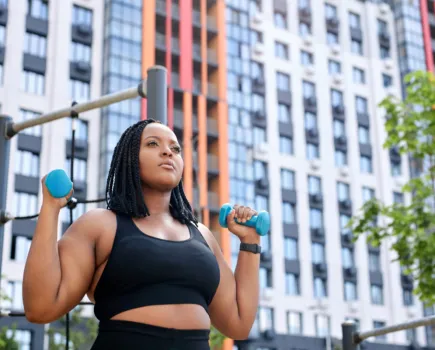Have you ever started a new workout plan full of excitement, only to quit a few weeks later? You’re not alone. 80% of people give up on their fitness goals by February. But here’s the good news: Sticking to exercise isn’t about willpower—it’s about smart strategies.
After helping hundreds of clients stay consistent, I’ve discovered the 7 most effective ways to make fitness a lifelong habit. Whether you’re a beginner or just need a motivation boost, these tips will help you show up even on days when the couch looks tempting.

Why Most People Quit (And How to Avoid It)
Before we dive into solutions, let’s understand the 3 biggest reasons people struggle:
- Unrealistic expectations (“I’ll workout 7 days a week!”)
- No immediate results (Giving up before seeing changes)
- Boring routines (Doing exercises you hate)
Now, let’s fix these problems with science-backed solutions.
1. Start So Small It Feels Ridiculous
Problem: Most people try to do too much too soon.
Solution: Use the “2-Minute Rule”:
- Week 1: Just put on workout clothes
- Week 2: 5-minute workout
- Week 3: 10-minute workout
Why it works: Your brain resists big changes but accepts small ones. Once you start, you’ll often do more than planned.
🔗 Related: The Science of Tiny Habits
2. Schedule Workouts Like Important Meetings
Problem: “I’ll exercise when I have time” = never.
Solution:
- Mark 3 weekly workouts in your calendar
- Set phone reminders
- Treat them like doctor’s appointments
Pro Tip: Morning workouts have the highest completion rate (before daily excuses pile up).
3. Find Workouts You Actually Enjoy
Stop forcing yourself to do exercises you hate! Fitness should be fun. Try:
| If You Love… | Try These Workouts |
|---|---|
| Socializing | Group classes, sports teams |
| Alone Time | Yoga, running, home workouts |
| Competition | CrossFit, martial arts |
| Relaxation | Swimming, walking in nature |
Key: If you dread it, you won’t stick with it.
4. Use the “Never Miss Twice” Rule
Problem: One missed workout turns into quitting.
Solution: Allow yourself to skip—but never twice in a row.
Example:
- Miss Monday? Must go Tuesday.
- Sick Tuesday? Go Wednesday.
This prevents the “I’ve already failed” mentality.
5. Track Progress Beyond the Scale
Weight fluctuates daily. Better metrics:
✔ Workout streaks (use a habit tracker app)
✔ Energy levels
✔ Clothes fitting better
✔ Doing more reps/weight than last month
Pro Tip: Take monthly progress photos—the changes will shock you!
🔗 External Link: Best Fitness Tracking Apps 2024
6. Prepare Like a Pro Athlete
Most failures happen before the workout starts. Set yourself up for success:
Night Before:
- Lay out workout clothes
- Prep gym bag
- Set alarm 30 minutes earlier
For Home Workouts:
- Keep mat/weights visible
- Bookmark follow-along videos
Why it works: Fewer decisions = fewer excuses.
7. Reward Effort, Not Just Results
Our brains need instant gratification. Celebrate showing up!
Good Rewards:
- Post-workout smoothie
- 10 minutes of guilt-free scrolling
- New workout gear after 10 consistent sessions
Bad Rewards:
- Junk food binges
- Skipping next workout
Bonus: What to Do When Motivation Disappears
Even with perfect plans, you’ll have off days. Try these emergency motivation tricks:
- The 5-Minute Deal: “I’ll just move for 5 minutes” (usually leads to a full workout)
- Play Your “Power Song” (Fast music boosts energy by 20%)
- Remember Your “Why” (Visualize your health goals)
Final Tip: It Gets Easier
The first 3-4 weeks are the hardest. After 6 weeks, your body will CRAVE movement. Stick with it until exercise becomes part of your identity—not just something you “should” do.

Your Action Step: Pick one tip from this list and implement it today. Small steps lead to big changes!
FAQs About Sticking to Fitness
Q: How long until exercise becomes a habit?
A: Research shows 66 days on average—but starts feeling easier around week 3.
Q: What if I hate all exercise?
A: You haven’t found your type yet! Try dance, hiking, or recreational sports.
Q: Is 3 short workouts better than 1 long one?
A: Yes! Consistency matters most. Three 20-minute sessions beat one hour-long weekly workout.
